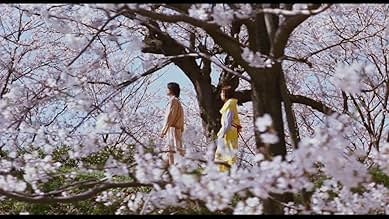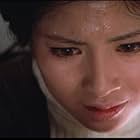Three stories of never-ending love.Three stories of never-ending love.Three stories of never-ending love.
- Awards
- 3 wins & 7 nominations total
Kyôko Fukada
- Haruna Yamaguchi, the Pop Star
- (as Kyoko Fukada)
- Director
- Writer
- All cast & crew
- Production, box office & more at IMDbPro
Featured reviews
3 stories of doomed relation ships. all jumbled together.
I just got done watching this movie. Yes it's slow. Yes there isn't a lot of dialogue. But this movie is brilliant. The visuals, the style, the symbolism, the utter sadness..
This isn't a movie for people who want action. or people who want dialogue. Visuals people, READ the visuals. The story is told through images.
It's beautiful. But very depressing.
HIGHLY recommended.
I just got done watching this movie. Yes it's slow. Yes there isn't a lot of dialogue. But this movie is brilliant. The visuals, the style, the symbolism, the utter sadness..
This isn't a movie for people who want action. or people who want dialogue. Visuals people, READ the visuals. The story is told through images.
It's beautiful. But very depressing.
HIGHLY recommended.
10noralee
"Dolls" is a gripping lesson in film as a visual medium, even when exploring territory that Beckett and Bergman handled verbally.
Takeshi Kitano wrote, directed and edited with astonishing beauty and poignancy, way beyond the audience pleasing romp of "Zatôichi: The Blind Swordsman." With minimal dialog, he is in a great partnership with the breathtaking cinematography of Katsumi Yanagishima, which uses seasonal changes as powerful visual and emotional metaphors as did "Spring, Summer, Fall, Winter... and Spring (Bom yeoreum gaeul gyeoul geurigo bom)," and the moody music of Joe Hisaishi, which effectively switches back and forth from traditional to Western instrumentation, as the film opens with a Bunraku puppet theater performance and then the stories of three casually intersecting couples gradually enact the sensibility of this what I presume is a traditional tale. The senses are so powerfully called upon that when two blinded characters stand in a rose garden I practically smelled the flowers.
While I am sure I missed a multitude of references and symbols, particularly colors, to elements of Japanese culture past and present, the very powerful themes of the spectrum of ambition destroying love such that love becomes a guilt-filled responsibility at one extreme and obsession at the other are similarly hauntingly recalled in Western culture, such as in old English ballads and more contemporary versions like "The Long Black Veil" and Springsteen's "Reason to Believe." I also felt resonances from "Waiting for Godot" to classics sensitively sympathetic to love-tossed women as "Madame Bovary" and "Anna Karenina."
Flashbacks are used powerfully in a Joycean stream of consciousness way, so that we see the memories, dreams and disturbing nightmares of the characters'associations, literally showing us the Faulknerian dictum that "The past is never dead. It's never even past." This adds considerable emotional build-up for each character as they restlessly return to geographies with meanings to their lives and we gradually see what they were like before their current emotionally (or in some cases physically) stunted states so we heartbreakingly understand their personal iconography, particularly for those two unforgettably bound beggars.
There is no Hollywood happy endings for these couples, only acceptance of the fates they have consciously and willingly chosen and committed themselves to. But their resignation is thrillingly moving in its very graphic representation.
Takeshi Kitano wrote, directed and edited with astonishing beauty and poignancy, way beyond the audience pleasing romp of "Zatôichi: The Blind Swordsman." With minimal dialog, he is in a great partnership with the breathtaking cinematography of Katsumi Yanagishima, which uses seasonal changes as powerful visual and emotional metaphors as did "Spring, Summer, Fall, Winter... and Spring (Bom yeoreum gaeul gyeoul geurigo bom)," and the moody music of Joe Hisaishi, which effectively switches back and forth from traditional to Western instrumentation, as the film opens with a Bunraku puppet theater performance and then the stories of three casually intersecting couples gradually enact the sensibility of this what I presume is a traditional tale. The senses are so powerfully called upon that when two blinded characters stand in a rose garden I practically smelled the flowers.
While I am sure I missed a multitude of references and symbols, particularly colors, to elements of Japanese culture past and present, the very powerful themes of the spectrum of ambition destroying love such that love becomes a guilt-filled responsibility at one extreme and obsession at the other are similarly hauntingly recalled in Western culture, such as in old English ballads and more contemporary versions like "The Long Black Veil" and Springsteen's "Reason to Believe." I also felt resonances from "Waiting for Godot" to classics sensitively sympathetic to love-tossed women as "Madame Bovary" and "Anna Karenina."
Flashbacks are used powerfully in a Joycean stream of consciousness way, so that we see the memories, dreams and disturbing nightmares of the characters'associations, literally showing us the Faulknerian dictum that "The past is never dead. It's never even past." This adds considerable emotional build-up for each character as they restlessly return to geographies with meanings to their lives and we gradually see what they were like before their current emotionally (or in some cases physically) stunted states so we heartbreakingly understand their personal iconography, particularly for those two unforgettably bound beggars.
There is no Hollywood happy endings for these couples, only acceptance of the fates they have consciously and willingly chosen and committed themselves to. But their resignation is thrillingly moving in its very graphic representation.
10ChrisJPN
It takes a while for DOLLS to sink in. Not because of the complexity of the stories intertwined through the film but because of the sheer emotional impact virtually every scene carries with it.
I won't go into details about the three stories but I can say that, above all else, DOLLS is a lesson in love and anguish and it is by far Kitano's most powerful work, even more so than Hana-bi.
I'm baffled by the negative reviews I've seen of this film since it was first aired. I wonder if it might be a case of the viewer needing to understand the way Japanese often tend to act and feel when faced with difficult or unbearable situations and without that understanding you might question if people would ever really act the way they do in DOLLS. The answer is that often they really do.
I've considered Kitano a master film maker for a long time now. The man has only ever made one film that can't be considered good (the embarrassingly poor Getting Any?) and I consider Hana-bi in particular to be one of the finest films ever made. But Dolls almost functions at another level. I don't know how often I will watch it because it genuinely is emotionally draining but this is simply a brilliant piece of film making. The cinematography is exquisite. The acting is fantastic, especially Miho Kanno who gives such a tragic, beautiful performance while hardly saying a world throughout the film. And above all, the emotional bond forged with the viewer is beyond any I think I've ever seen on film.
Anyone who truly loves film should see Dolls. Actors should see Dolls if only to see how little you really need to give in order to portray real emotion. Directors should see Dolls and learn from a master. I genuinely believe Kitano will go down in history as a genius film maker. Dolls may well be his masterpiece.
I won't go into details about the three stories but I can say that, above all else, DOLLS is a lesson in love and anguish and it is by far Kitano's most powerful work, even more so than Hana-bi.
I'm baffled by the negative reviews I've seen of this film since it was first aired. I wonder if it might be a case of the viewer needing to understand the way Japanese often tend to act and feel when faced with difficult or unbearable situations and without that understanding you might question if people would ever really act the way they do in DOLLS. The answer is that often they really do.
I've considered Kitano a master film maker for a long time now. The man has only ever made one film that can't be considered good (the embarrassingly poor Getting Any?) and I consider Hana-bi in particular to be one of the finest films ever made. But Dolls almost functions at another level. I don't know how often I will watch it because it genuinely is emotionally draining but this is simply a brilliant piece of film making. The cinematography is exquisite. The acting is fantastic, especially Miho Kanno who gives such a tragic, beautiful performance while hardly saying a world throughout the film. And above all, the emotional bond forged with the viewer is beyond any I think I've ever seen on film.
Anyone who truly loves film should see Dolls. Actors should see Dolls if only to see how little you really need to give in order to portray real emotion. Directors should see Dolls and learn from a master. I genuinely believe Kitano will go down in history as a genius film maker. Dolls may well be his masterpiece.
Kitano never fails to amaze me, and this movie is an exact epitome of the queer nature of his films. This movie is a collection of three love stories intersecting in the same time-line. The nature of love stories quite different from one-another and each one has a different essence to it.
First story is about a young couple, second story is about fan-idol love and the third one is about an unrequited love. All of these stories are somber and moving, and are not as mushy as typical love stories of Hollywood.
Cinematography in the film is awesome. There many long shots, which again is kind of Kitano's signature. Performance of the actors is quite good. Background score is beautiful and perfectly coherent with the scenes. The use of a puppet show in the movie is quite surreal and symbolic.
If you liked "Amorres Perros"; you will definitely like this movie.
A must watch for Kitano fans and those who admire subtle romance.
First story is about a young couple, second story is about fan-idol love and the third one is about an unrequited love. All of these stories are somber and moving, and are not as mushy as typical love stories of Hollywood.
Cinematography in the film is awesome. There many long shots, which again is kind of Kitano's signature. Performance of the actors is quite good. Background score is beautiful and perfectly coherent with the scenes. The use of a puppet show in the movie is quite surreal and symbolic.
If you liked "Amorres Perros"; you will definitely like this movie.
A must watch for Kitano fans and those who admire subtle romance.
Told through a mixture of old Japanese culture and contemporary film- making, the three separate love stories overlap and interweave cleverly but subtly, too.
Without any sullying from saccharine sweetness or melancholy, all three tales strain the credibility of what we would normally think a person's love for another would go to. But, that's the beauty - this is a dream- felt movie, exaggerating hardship and our emotions to emphasise that extraordinary bond that love can be.
It's all interconnected by symbolisms and the extraordinary cinematography of Katsumi Yanagijima has us shimmering and floating in rose gardens, amongst autumnal leaves and under cherry-tree blossom. It is here that we take breath and sigh, after the often difficult human journeys we've just seen the characters go through. We cannot help but feel that we have journeyed with them - and perhaps suffered too.
To me, it's the first story of the jilted bride who's rejection sends her insane and the subsequent redemption and dedication from her boyfriend to the extent that they become homeless that it the most moving. Their story united the other two stories and adds symbolism at the end. The tale of the ageing Yakuza who finally feels that he needs more than his violent lifestyle to exist as a human being and the fanaticism for a young pop singer also paint vivid pictures on Japan's social and cultural agenda.
It did remind me of south Korea's 'Spring, Summer, Autumn, Winter...' in that often idyllic and contemplative gestures and activities are interspersed with morally questioning random acts that leave cavities in people's lives and the atonement needed to rectify them; or at least to try to, in a soul-satisfying way.
Without any sullying from saccharine sweetness or melancholy, all three tales strain the credibility of what we would normally think a person's love for another would go to. But, that's the beauty - this is a dream- felt movie, exaggerating hardship and our emotions to emphasise that extraordinary bond that love can be.
It's all interconnected by symbolisms and the extraordinary cinematography of Katsumi Yanagijima has us shimmering and floating in rose gardens, amongst autumnal leaves and under cherry-tree blossom. It is here that we take breath and sigh, after the often difficult human journeys we've just seen the characters go through. We cannot help but feel that we have journeyed with them - and perhaps suffered too.
To me, it's the first story of the jilted bride who's rejection sends her insane and the subsequent redemption and dedication from her boyfriend to the extent that they become homeless that it the most moving. Their story united the other two stories and adds symbolism at the end. The tale of the ageing Yakuza who finally feels that he needs more than his violent lifestyle to exist as a human being and the fanaticism for a young pop singer also paint vivid pictures on Japan's social and cultural agenda.
It did remind me of south Korea's 'Spring, Summer, Autumn, Winter...' in that often idyllic and contemplative gestures and activities are interspersed with morally questioning random acts that leave cavities in people's lives and the atonement needed to rectify them; or at least to try to, in a soul-satisfying way.
Storyline
Did you know
- TriviaThis is the last Takeshi Kitano film to feature music by Joe Hisaishi. Kitano claimed that it became too expensive to hire Hisaishi for soundtracks while Hisaishi claimed that he didn't like the screenplay of the movie. Actually, they both had an argument about some pieces which weren't selected for the soundtrack, and where to put the others in the movie. They stopped working together since then.
- ConnectionsReferenced in Nobody Knows (2004)
Details
Box office
- Gross US & Canada
- $4,067
- Opening weekend US & Canada
- $2,067
- Dec 12, 2004
- Gross worldwide
- $5,405,725
- Runtime1 hour 54 minutes
- Color
- Sound mix
- Aspect ratio
- 1.85 : 1
Contribute to this page
Suggest an edit or add missing content
































